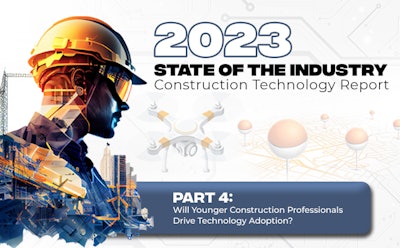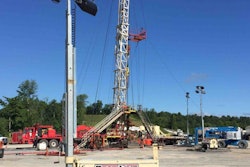
A primary research report from IRONPROS examines the degree to which younger professionals entering the construction industry will drive adoption of transformational technologies including:
- Artificial Intelligence (AI)
- Internet of Things (IoT)
- Augmented/Virtual Reality
- Connected Equipment
- Autonomous Equipment
This is the third installment in the FULL 2023 State of the Industry: Construction Technology Report, a four-part series that outlines the growing technology present in the construction industry, how contractors are currently embedding the technology into their workflow, the future of disruptive technology and the impact technology will have in acquiring a younger generation. Use the navigation bar below to maneuver through valuable industry insight. This series is available with free registration on IRONPROS.
- PART 1: IRONPROS Research Finds Field Productivity Software Most Significant Construction Technology Going into 2023
- PART 2: GPS-Asset Tracking Hardware, a Top 2023 Equipment Technology Priority
- PART 3: IRONPROS Study Reveals the Future of Disruptive Technology in Construction
- PART 4: Will Younger Construction Professionals Drive Technology Adoption?
- FULL 2023 State of the Industry: Construction Technology Report
Multiple construction experts, journalists and vendors have posited that while the construction industry has been slow to adopt these technologies when compared to other industrial sectors, technology could be helpful in attracting younger workers.
Some have also posited that more complete adoption of these technologies across various industries may be helped along by these same younger workers. One 2019 report from the Committee for European Construction Equipment describes this “chicken and egg” problem where younger people are more accepting of technology, but technology will be helpful for recruiting younger workers:
“From the interviews it emerges that the construction sector suffers from a ‘generational issue.’ Older workers, who have developed a strong expertise and knowledge, represent the majority of the construction workforce (in the US the average age of construction workers has increased by seven years between 1985 and 2014 and the trend is similar in EU countries as stated in the European Construction Sector Observatory reports). However, they tend to be less open to the adoption of digital technologies. While the average age of construction workers has been constantly increasing and in many cases retirement age is approaching, it has not been coupled with an increased presence of younger generations. Young people still consider the construction sector as ‘dirty, dangerous and demeaning.’ This is also one of the reasons why the number of women in the sector tends to be much lower than their male counterparts.”
The study report, available for free download, suggests seeing potential for disruptive technologies in construction correlates more closely to a corporate position — making them appreciate the contribution they can make to lowering cost and risk, shortening timelines or increasing margin.
“It is certainly true that our consumer technologies have advanced faster in most cases than the technology we see used in construction and some other industries,” says AC Business Media Ron Spink. “But what will drive AI, IoT and other disruptive tech into contracting businesses and construction sites is not the fact that it is cool, but the fact that it can improve outcomes. Our data suggest the construction professionals being measured on results will be the ones most loudly clamoring for technology that can improve these results.”



















